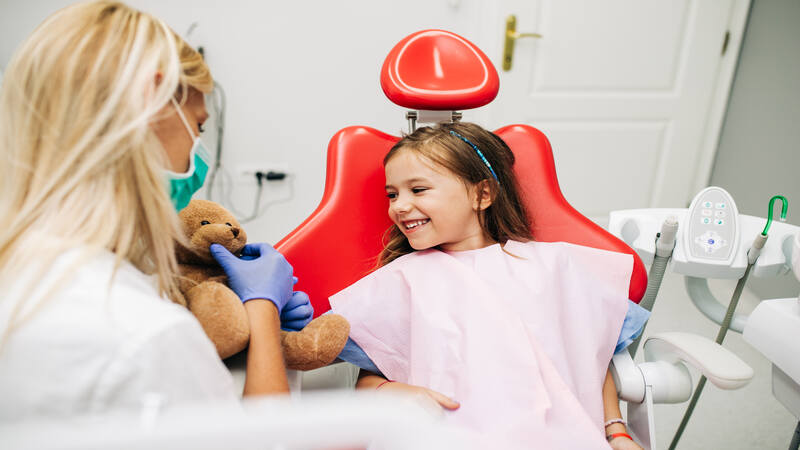
Oral health is an integral part of the overall health of toddlers. Dental caries is a common oral problem among toddlers. The prevalence remains greater than 23% among kids 2 to 5 years of age (1a), and 52% among kids 6 to 8 years (1b). As a parent, you would always want the best for your toddler, which includes good oral health. Good oral health in toddlers involves healthy teeth and gums which are important for a beautiful smile and overall well-being.
Taking care of primary teeth is equally important since these baby teeth act as a cornerstone for the eruption of permanent teeth in the future. Healthy primary teeth pave the way for healthy permanent or adult teeth (2). Teaching your toddlers good oral habits from a young age can set them on a path to a lifetime of having healthy teeth and gums. In this comprehensive blog, we will explore the top five tips to maintain good oral health in toddlers.
Tips to Maintain Oral Health in Toddlers
Good oral hygiene is essential to have healthy teeth and gums in toddlers. Primary or baby teeth are essential since they help the kids to talk, smile, and eat. Moreover, they also act as placeholders for the permanent teeth. If they are damaged and fall out too quickly, the lost tooth can cause the remaining teeth to shift into undesirable positions. This causes the permanent teeth to come out crooked (3). Here is a list of the top five useful tips to maintain oral health in toddlers:
1. Let Them Build a Rapport With The Dentist

Picking up the right dentist for your toddler is the key to successful dental outcomes. This also helps them overcome challenges like dental fear and anxiety. Find a trained pediatric dentist and let your toddler get familiar with them. Building a rapport with the dentist is essential for a smooth and calm working environment (4). Let your dentist do all the explaining in the most simple way to reassure your toddler about the importance of regular checkups and good oral hygiene practices.
[Read : 7 Tips for Helping Your Child Feel Comfortable at the Dentist’s Office]
2. Keep it Fun

You do not have to make regular brushing and flossing boring. Make things fun for your toddler through the following tips:
- Play some good music (related to brushing teeth) to pep up your kid.
- Reward your toddler with small gifts or goodies whenever they brush their teeth. Earning such rewards will make them continue brushing and make it a habit.
- Be sure to track their progress and encourage them to continue it through positive reinforcement (5).
- Be creative and tell them some fun stories everyday about brushing. This will engage your toddler’s imagination while they brush and floss.
3. Make it a Routine
Inculcate good oral hygiene practices like regular brushing and flossing in their daily routine. This should begin from an early age which must be consistent (6). Explain to them in simple language the importance of these hygiene practices in improving oral health in toddlers and how they can impart a beautiful smile.
4. Set a Good Example
Show your toddler by demonstrating the right brushing and flossing techniques. Set an example for your toddler by taking care of your teeth in front of them. Physical demonstration makes a lasting impact on them and the idea of good oral health will sink in more easily (7).
5. Opt For Good Food Choices

Eating right is another crucial aspect of oral health in toddlers. Consuming a teeth-friendly diet that includes fresh fruits, vegetables, dairy products (milk, cheese), lean meats, and whole grains is essential for optimal oral health. These offer all the essential nutrients needed for healthy teeth and gums. Refrain from excess sugar intake by avoiding sodas, pastries, candies, and sticky foods that can increase their risk of dental decay and gum disease due to plaque build-up. Also, increase the intake of water to help flush out harmful toxins from the toddler’s mouth (8).
As a parent, you must take the sole responsibility for good oral health in toddlers. Taking care of primary teeth at a young age helps them continue healthy habits as they grow into an adult. By using different techniques like indulging toddlers in fun activities, positive reinforcement, and creative storytelling, you can make oral care routines exciting and engaging for your kids. With patience, perseverance, and having definite oral care goals in mind, you can help impart a healthy, and beautiful smile to your toddlers for years to come.
[Read : Top 5 Eating And Drinking Tips For Toddler’s Oral Health]
FAQ’s
1. How to Maintain Good Oral Health in Kids?
You can help maintain good oral health in kids by inculcating good oral habits in them like brushing and flossing twice daily, using fluoride toothpaste, encouraging them to consume a healthy diet, refraining from having excess sugary foods and drinks, and taking them to a dentist every once in six months.
2. What Causes Poor Oral Health in Children?
There are several reasons for poor oral health in children such as poor eating habits (excess sugar intake), improper brushing and flossing habits, and lastly, failure to use fluorides. Sometimes genetics also plays a pivotal role in poor oral health in children.
3. What Are The Most Common Oral Habits in Children?
The most common oral habits in children are thumb sucking, mouth breathing, pacifier use, nail and pencil biting, tongue thrusting, lip biting, and bruxism (grinding the teeth and clenching the jaw).
References
- National Institute of Dental and Craniofacial Research (NIDCR) – https://www.nidcr.nih.gov/research/data-statistics/dental-caries/children
- Vittoba Setty J, Srinivasan I. Knowledge and Awareness of Primary Teeth and Their Importance among Parents in Bengaluru City, India. Int J Clin Pediatr Dent. 2016 Jan-Mar;9(1):56-61. doi: 10.5005/jp-journals-10005-1334. Epub 2016 Apr 22. PMID: 27274157; PMCID: PMC4890064. – https://www.ncbi.nlm.nih.gov/pmc/articles/PMC4890064/
- Spodzieja K, Olczak-Kowalczyk D. Premature Loss of Deciduous Teeth as a Symptom of Systemic Disease: A Narrative Literature Review. Int J Environ Res Public Health. 2022 Mar 13;19(6):3386. doi: 10.3390/ijerph19063386. PMID: 35329073; PMCID: PMC8953685. – https://www.ncbi.nlm.nih.gov/pmc/articles/PMC8953685/
- Alsarheed M. Children’s Perception of Their Dentists. Eur J Dent. 2011 Apr;5(2):186-90. PMID: 21494387; PMCID: PMC3075993. – https://www.ncbi.nlm.nih.gov/pmc/articles/PMC3075993/
- de Jong-Lenters M, L’Hoir M, Polak E, Duijster D. Promoting parenting strategies to improve tooth brushing in children: design of a non-randomised cluster-controlled trial. BMC Oral Health. 2019 Sep 6;19(1):210. doi: 10.1186/s12903-019-0902-6. PMID: 31492121; PMCID: PMC6731582. – https://www.ncbi.nlm.nih.gov/pmc/articles/PMC6731582/
- Tadin A, Poljak Guberina R, Domazet J, Gavic L. Oral Hygiene Practices and Oral Health Knowledge among Students in Split, Croatia. Healthcare (Basel). 2022 Feb 21;10(2):406. doi: 10.3390/healthcare10020406. PMID: 35207018; PMCID: PMC8872387. – https://www.ncbi.nlm.nih.gov/pmc/articles/PMC8872387/
- Kaushik M, Sood S. A Systematic Review of Parents’ Knowledge of Children’s Oral Health. Cureus. 2023 Jul 6;15(7):e41485. doi: 10.7759/cureus.41485. PMID: 37551253; PMCID: PMC10404335. – https://www.ncbi.nlm.nih.gov/pmc/articles/PMC10404335/
- Tungare S, Paranjpe AG. Diet and Nutrition to Prevent Dental Problems. [Updated 2023 Jul 10]. In: StatPearls [Internet]. Treasure Island (FL): StatPearls Publishing; 2024 Jan-. – https://www.ncbi.nlm.nih.gov/books/NBK534248/
Read Also: Preventive Dental Care in Toddlers
